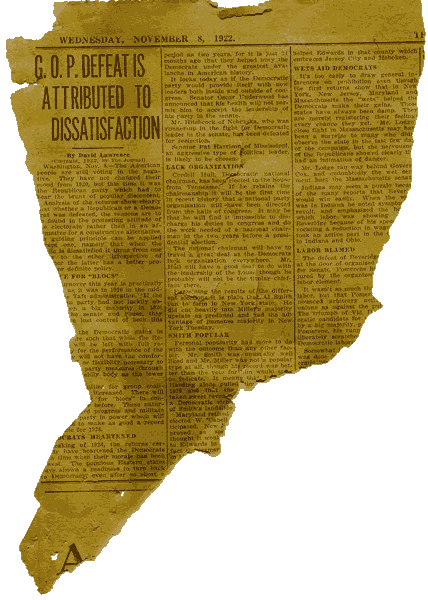As I mentioned a couple of weeks back, we found some newspapers under the floorboards of our attic that dated to the mid-term elections of another era famous for a president soaking in oil corruption: Warren Harding.
This story reminds us of an era when principled Republicans held leadership positions in this country and acted on their principles. When the word “progressive” wasn’t disdained by Republican and mainstream Democrat alike.
From the Morning Oregonian, Thursday, 9 November 1922:
“PROGRESSIVE BLOC”
TO CONTROL SENATEPRESIDENT AND PARTY LOSE
BALANCE OF POWERWesterners and Radicals Group
Counted On to Block Poli-
cies of Administration(By Chicago Tribune Leased Wire.)
WASHINGTON, D.C., Nov. 8.—President Harding as a result of yesterday’s election will be unable to control the legislative branch of the government after March 4 next.
Although, in the face of the returns, the republicans will be able to organize the 68th congress, it is the conviction of political leaders here that the balance of power in both branches will be held by a group of western progressives and radicals who have it within their power to block any legislative programme which the administration may undertake during the next two years of President Harding’s term.
On the face of the latest returns, democratic leaders here were beginning to put forth claims of control of the house and predictions that the republican majority of 24 in the senate would be cut to about six. Even if those claims are proven excessive, the radical balance of power will exist just the same.
Senators LaFollette, Wisconsin; Borah, Idaho; Johnson, California; Norris, Nebraska; Norbeck, South Dakota, strengthened by the election of Colonel Smith Brookhart in Iowa, Dr. Hendrik Shipstead in Minnesota and R. B. Howell in Nebraska, will form a “progressive bloc” which will stand as a deciding factor in practically every issue which comes before the senate after March 4.
With four or five others of slightly less pronounced progressive views always possible allies, they appear to be in a position to exert a more powerful influence on the legislative affairs of the country than at any time since insurgency days prior to 1912.
The situation in the house is similar. Even if the republicans succeed in retaining perfunctory control of the lower house organization they will find it next to impossible to carry out administration policies because they will be constantly blocked by insurgents holding the balance of power.
Note that the Senators mentioned in this piece were members of the Republican party (although some had helped establish Teddy Roosevelt’s Progressive Party in his 1912 run for President) except for Shipstead, who was a Farmer-Labor candidate. Would that we had their like again.
Of course, they were still up against powerful forces, and the economy still augered into the ground seven years later.





